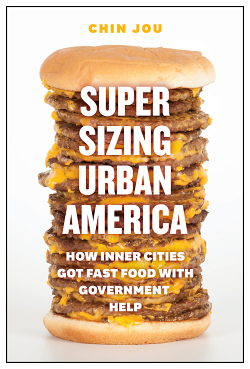An Unfortunate Confluence of Motives: Fast Food as Economic Development
DOI:
https://doi.org/10.5304/jafscd.2017.074.011
Keywords:
Fast Food, Food Policy, Nixon Administration, Obesity, Community HealthAbstract
First paragraphs:
The food movement keeps returning to a handful of themes: the industrialization of food, the promise and challenges of local food, the shenanigans of large corporate players and the like. Rare is a work like Chin Jou’s Supersizing Urban America, which explores a facet of food—one that has serious health consequences—in a potentially new and intriguing way by linking local food environments to a relatively obscure federal program.
The majority of the book is a history of how fast food franchises came to dominate the urban landscape. Jou claims that as late as the 1960s, African Americans were eating better than whites (a claim with so many implications that it deserves a book in its own right). By the early 1970s, the Nixon Administration was looking for explicitly capitalist—that is, decidedly noncommunist—strategies to revitalize urban neighborhoods torn apart by the violence of the ’60s. It focused on promoting black entrepreneurship.
Metrics

Downloads
Published
How to Cite
Issue
Section
Categories
License
Copyright (c) 2017 Parke Troutman

This work is licensed under a Creative Commons Attribution 4.0 International License.
The copyright to all content published in JAFSCD belongs to the author(s). It is licensed as CC BY 4.0. This license determines how you may reprint, copy, distribute, or otherwise share JAFSCD content.













